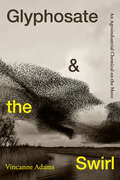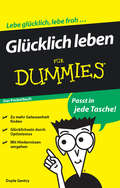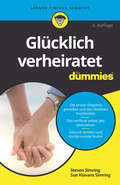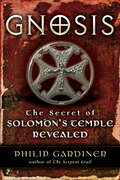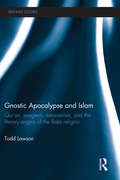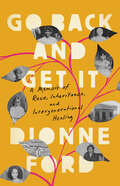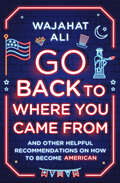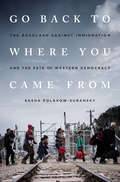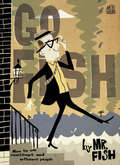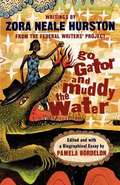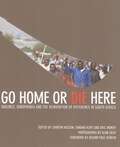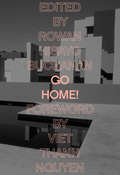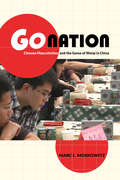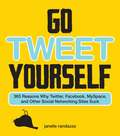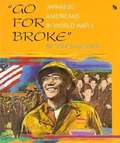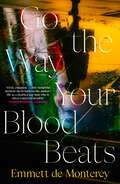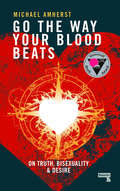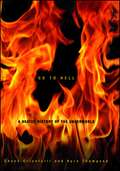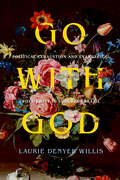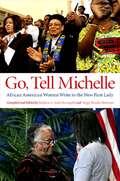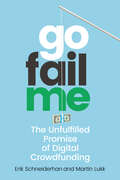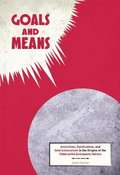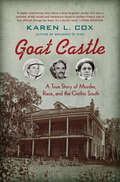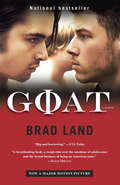- Table View
- List View
Glyphosate and the Swirl: An Agroindustrial Chemical on the Move (Critical Global Health: Evidence, Efficacy, Ethnography)
by Vincanne AdamsIn Glyphosate and the Swirl Vincanne Adams explores the chemical glyphosate—the active ingredient in Roundup and a pervasive agricultural herbicide—as a predicament of contested science and chemically saturated life. Adams traces the history of glyphosate’s invention and its multiple uses as activists, regulators, scientists, clinicians, consumers, and sick people try to determine its safety and harm. Scientific and political debates over glyphosate’s toxicity are agitated into a swirl—a condition in which certainty is continually contested, divided, and multiplied. This movement replicates the chemical’s movement in soils, foods, bodies, archives, labs, and legislative bodies, settling in some places here and in other places there, its potencies changing and altering what it touches with different scales and kinds of impact. The swirl is both an artifact of academic capitalism, activist tactics, and contested scientific facts and a way to capture the complexity of contemporary life with chemicals.
Glücklich leben für Dummies (Für Dummies)
by W. Doyle GentryGlücklich sein - wer will das nicht? Doyle Gentry zeigt Ihnen, dass Sie es auch lernen können. Ganz wichtig dafür sind das eigene Verhalten und die eigene Weltsicht. Sie erfahren wie Optimismus, Achtsamkeit und Solidarität das Glücklichsein verstärken können. Der Autor geht darauf ein, wie man glückliche Beziehungen - mit dem Partner und in der Familie - gestalten kann. Dazu kommen jede Menge Tipps, wie man Hindernisse zum Glück aus dem Weg räumt, wie man dem Glück auf die Sprünge helfen kann und welche Gedanken das Glücklichsein bestärken.
Glücklich verheiratet für Dummies (Für Dummies)
by Steven Simring Sue Klavans Simring"Bis dass der Tod euch scheidet", heißt es im Ehegelübde. Doch für viele Menschen ist und bleibt das ein Wunschtraum. Damit Sie nicht zu denen gehören, die die Scheidungsrate in die Höhe treiben, erklärt Ihnen das Autorenehepaar Sue Klavans Simring und Steven Simring, was nötig ist, um alle großen und kleinen Krisen zu meistern und eine erfüllte Ehe zu führen. Sie erfahren, wie Sie konstruktiv mit den alltäglichen und nicht so ganz-alltäglichen Problemen des Ehelebens umgehen und Ihren Partner noch besser kennen und verstehen lernen. Die Autoren zeigen Ihnen, wie Sie mit einfachen Techniken wieder frischen Wind in die Beziehung bringen - inner- und außerhalb des Schlafzimmers. Lesen Sie, EHE es zu spät ist!
GmbH-Handbuch für den Mittelstand
by Heinz-Peter VerspayDie GmbH ist mit mehr als einer Million Gesellschaften die häufigste Gesellschaftsform für Kapitalgesellschaften in Deutschland. Das große Interesse an ihr beruht auf dem Bedürfnis, die aus der Geschäftstätigkeit folgende Haftung der Gesellschafter auszuschließen. Für Verbindlichkeiten der GmbH haftet deren Gläubigern grundsätzlich nur das Gesellschaftsvermögen. Mit diesem Buch werden die Gründung der GmbH einschließlich der Unternehmergesellschaft (haftungsbeschränkt) und die mit dieser Rechtsform verbundenen Besonderheiten bei den bestehenden Gesellschaften für den Praktiker dargestellt. Das Buch informiert Geschäftsführer und Gesellschafter einer GmbH über ihre Funktionen und ihre Rechte und Pflichten.Die Erstauflage dieses Buches war zum Inkrafttreten der großen GmbH-Reform Ende 2008 fertiggestellt worden. Die von den Fachleuten einhellig begrüßte Reform, mit der die Rechtsform der GmbH durch Deregulierung und Modernisierung attraktiver gemacht werden sollte, warein "großer Wurf". Die 3. Auflage kann sich angesichts der Vielzahl der seitdem ergangenen gerichtlichen Entscheidungen auf eine verfestigte Rechtsprechung stützen. Sie umfasst darüber hinaus die zwischenzeitlich erfolgten Änderungen und Erweiterungen der für die GmbH maßgeblichen Gesetzesbestimmungen. Das Buch setzt keine juristischen Vorkenntnisse voraus. Aufgrund der tiefen Gliederung und des ausführlichen Sachverzeichnisses eignet es sich hervorragend als Nachschlagewerk für den Praktiker.
Gnosis: The Secrets of Solomon's Temple Revealed
by Philip GardinerAn examination of the alluring mysteries surrounding the ancient temple, revealing answers to questions that have puzzled generations.Solomon’s Temple in Jerusalem—reputed to be the source of the most esoteric knowledge in human history—has fascinated scholars, seekers and dreamers for centuries. Generations of scholars and researchers have tried in vain to discover the fabled Temple of Solomon, only to be confronted by one problem after another. All the problems raised by these disparate and often desperate people have now been fully answered and can be revealed to the world.Through his own involvement in secret societies and his tenacious spirit, Philip Gardiner has unearthed the secrets of the Temple. From the Queen of Sheba and the arcane secrets of the Christian Gnostics to the Muslim Sufi and Hindu Avatars, Gnosis weaves a tale that is both profound and precise. Gardiner declares that the truth of Solomon’s Temple has been known all along within the realm of esoteric understanding. Only one question remains: Is the world ready for the truth?Find the true secret of the Knights Templar and the mysteries of the ancients. Find the truth for yourself in Gnosis.Praise for Gnosis“Controversial, provocative, even profoundly “irritating” to some. . . . Gardiner eruditely challenges us all with this refreshing study . . . from the Garden of Eden into more modern times.” —Dr. Karen Ralls, medieval historian and author of The Templars and the Grail“Gnosis is a refreshing creation of true spiritual teaching—as well as being a damn good read. Gardiner possesses that rare ability to weave history, mythology and spiritual tradition into writing that is both understandable and enjoyable. Gnosis will fascinate readers with its complex insights into spirituality.” —Gnostic Communications internet magazine“In this remarkable and thought-provoking book, Gardiner has literally undressed the sacred mystical language of our ancestors and reveals one of the most profound Biblical concepts to be exposed in recent times.” —Ernest Scott, author of The People of the Secret
Gnostic Apocalypse and Islam: Qur'an, Exegesis, Messianism and the Literary Origins of the Babi Religion (Iranian Studies)
by Todd LawsonOf the several works on the rise and development of the Babi movement, especially those dealing with the life and work of its founder, Sayyid Ali Muhammad Shirazi, few deal directly with the compelling and complex web of mysticism, theology and philosophy found in his earliest compositions. This book examines the Islamic roots of the Babi religion, (and by extension the later Baha’i faith which developed out of it), through the Qur’anic commentaries of the Bab and sheds light on its relationship to the wider religious milieu and its profound debt to esoteric Islam, especially Shi'ism. Todd Lawson places the two earliest writings of the Bab within the diverse contexts necessary to understand them, in order to explain why these writings made sense to and inspired his followers. He delves into the history of the tafsir (Qur’an commentary) genre of Islamic scholarship, situates these early writings in the Akhbari, Sufi and most importantly Shaykhi traditions of Islam. In the process, he identifies both the continuities and discontinuities between these works and earlier works of Shi’i tafsir, helping us appreciate significant elements of the Bab’s thought and claims. Filling an important gap in the existing literature on the Babi movement, this book will be of greatest interest to students and scholars of Qur'an commentary, Mysticism, Shi'ism, the modern history of Iran and messianism.
Go Back and Get It: A Memoir of Race, Inheritance, and Intergenerational Healing
by Dionne FordAn unexpected family photograph leads Dionne Ford to uncover the stories of her enslaved female ancestors, reclaim their power, and begin to heal Countless Black Americans descended from slavery are related to the enslavers who bought and sold their ancestors. Among them is Dionne Ford, whose great grandmother was the last of six children born to a Louisiana cotton broker and the enslaved woman he received as a wedding gift. What shapes does this kind of intergenerational trauma take? In these pages, which move between her inner life and deep research, Ford tells us. It manifests as alcoholism and post-traumatic stress; it finds echoes in her own experience of sexual abuse at the hands of a relative, and in the ways in which she builds her own interracial family. To heal, Ford tries a wide range of therapies, lifestyle changes, and recovery meetings. &“Anything,&” she writes, &“to keep from going back there.&” But what she learns is that she needs to go back there, to return to her female ancestors, and unearth what she can about them to start to feel whole.
Go Back to Where You Came From: And Other Helpful Recommendations on How to Become American
by Wajahat Ali“Go back to where you came from, you terrorist!” This is just one of the many warm, lovely, and helpful tips that Wajahat Ali and other children of immigrants receive on a daily basis. Go back where, exactly? Fremont, California, where he grew up, but is now an unaffordable place to live? Or Pakistan, the country his parents left behind a half-century ago? Growing up living the suburban American dream, young Wajahat devoured comic books (devoid of brown superheroes) and fielded well-intentioned advice from uncles and aunties. (“Become a doctor!”) He had turmeric stains under his fingernails, was accident-prone, suffered from OCD, and wore Husky pants, but he was as American as his neighbors, with roots all over the world. Then, while Ali was studying at University of California, Berkeley, 9/11 happened. Muslims replaced communists as America’s enemy #1, and he became an accidental spokesman and ambassador of all ordinary, unthreatening things Muslim-y. Now a middle-aged dad, Ali has become one of the foremost and funniest public intellectuals in America. In Go Back to Where You Came From, he tackles the dangers of Islamophobia, white supremacy, and chocolate hummus, peppering personal stories with astute insights into national security, immigration, and pop culture. In this refreshingly bold, hopeful, and uproarious memoir, Ali offers indispensable lessons for cultivating a more compassionate, inclusive, and delicious America.
Go Back to Where You Came From: The Backlash Against Immigration and the Fate of Western Democracy
by Sasha Polakow-SuranskyWhat if the new far right poses a graver threat to liberal democracy than jihadists or mass migration?Brexit and Donald Trump's victory were just the beginning--and Marine Le Pen's defeat does not signal a turning of the tide. --From the IntroductionFrom Europe to the United States, opportunistic politicians have exploited the economic crisis, terrorist attacks, and an unprecedented influx of refugees to bring hateful and reactionary views from the margins of political discourse into the mainstream. They have won the votes of workers, women, gays, and Jews; turned openly xenophobic ideas into state policy; and pulled besieged centrist parties to the right. How did we get here?In this deeply reported account, Sasha Polakow-Suransky provides a front-row seat to the anger, desperation, and dissent that are driving some voters into the arms of the far right and stirring others to resist. He introduces readers to refugees in the Calais "Jungle" and the angry working-class neighbors who want them out; a World War II refugee-turned-rabbi who became a leading defender of Muslim immigrants; the children of Holocaust survivors who have become apologists for the new right; and alt-right activists and the intellectuals who enable them.Polakow-Suransky chronicles how the backlash against refugees and immigrants has reshaped our political landscape. Ultimately, he argues that the greatest threat comes not from outside, but from within--even established democracies are at risk of betraying their core values and falling apart.
Go Fish: How To Win Contempt And Influence People
by Mr Fish"Mr. Fish dissects the journalistic responsibility he faces as a cartoonist to make it make sense. It being his raw emotional output in response to a given stimuli (government, society, et al) manifesting itself via pen on paper without regard to the cleverly pointed punchline that will accompany and ultimately define it. . . The drawings are a celebration of the technical mastery and unbridled emotional truth of Dwayne Booth -- the Clark Kent to Superman's Mr. Fish."--Huffington Post"Fish's work makes you want to do something--even if you're not entirely sure what that something is--to change things for the better, and the feeling stays with you long after the book is closed."--Verbicide Magazine"Few individuals are as clued in to the volatility of the current political climate as iconic cartoonist Dwayne Booth (aka Mr. Fish). . . known for pointed and piquant single-panel cartoons that fearlessly and relentlessly take on the most sacred of cows in public life."--LA Weekly"A vibrant example of political cartooning as it is practiced at its heights... Anyone who thinks political cartooning is stale need only take a closer look at this body of work... Certifiably brilliant... The photographic elegance and immediacy with which this drawing is executed is typical of the most refined Mr. Fish style."--Los Angeles Review of BookThis debut volume of political cartoons from the revered Mr. Fish spans politics, popular culture, the economic crisis, the Obama presidency, and much more, where nobody--right, left, or middle--is safe from his razor-edged satire. The volume also includes original essays by Mr. Fish.Mr. Fish has been a freelance writer and cartoonist for eighteen years, publishing under both his real name (Dwayne Booth) and the penname of Mr. Fish with many of the nation's most reputable and prestigious magazines, journals, and newspapers. In addition to his weekly cartoon for Harper's and daily contributions to Truthdig.com, he has also contributed to the Los Angeles Times, the Village Voice, the LA Weekly, the Atlantic, the Huffington Post, Vanity Fair, Mother Jones, the Advocate, Z Magazine, the Utne Reader, Slate.com, MSNBC.com, and others.
Go Gator and Muddy the Water
by Zora Neale Hurston Pamela Bordelon"Researching a work on the Florida Federal Writers' Project, Pamela Bordelon discovered writings in the collection that were unmistakably from the hand of Zora Neale Hurston, author of Their Eyes Were Watching God and one of the leading writers of the Harlem Renaissance. Most of these works are not well known. All of Hurston's novels draw upon her deep interest in folklore, particularly from Florida, her home state. Here we see the roots of that work, from the captivating folktale of the monstrous alligator living in a local lake to her recording of folk songs and her work on children's games and the black church. Of great interest are the transcriptions of a rare interview with Hurston singing gambling and work songs and telling how she learned them." --BOOK JACKET. Title Summary field provided by Blackwell North America, Inc. All Rights Reserved
Go Home or Die Here: Violence, Xenophobia and the Reinvention of Difference in South Africa
by Devan Pillay Shireen Hassim Pumla Dineo Gqola Noor Nieftagodien Daryl Glaser Tawana Kupe Eric Worby Alex Eliseev Rolf Maruping Stephen Gelb Loren Landau David Coplan Julia Hornberger Melinda Silverman Tanya Zack Anton Harber Cathi Albertyn Andile Mngxitama Véronique TadjoThe xenophobic attacks that started in Alexandra, Johannesburg in May 2008 before quickly spreading around the country caused an outcry across the world and raised many fundamental questions: Of what profound social malaise is xenophobia – and the violence that it inspires – a symptom? Have our economic and political choices created new forms of exclusion that fuel anger and distrust? What consequences does the emergence of xenophobia hold for the idea of an equal, non-racial society as symbolised by a democratic South Africa?On 28 May 2008 the Faculty of Humanities in the University of the Witwatersrand, Johannesburg convened an urgent colloquium that focused on searching for short and long-term solutions. Nearly twenty individuals – mostly Wits academics from a variety of disciplines, but also two student leaders, a journalist and a bishop – addressed the unfolding violence in ways that were conversant with the moment, yet rooted in scholarship and ongoing research.Go Home or Die Here emanates directly from the colloquium. It hopes to make sense of the nuances and trajectories of building a democratic society out of a deeply divided and conflictual past, in the conditions of global recession, heightening inequalities and future uncertainty. The authors hoped to pose questions that would lead both to research and to more informed, reflective forms of public action. With extensive photographs by award-winning photographer Alon Skuy, who covered the violence for The Times newspaper, the volume is passionate and engaged, and aims to stimulate reflection, debate and activism among concerned members of a broad public.
Go Home!
by Edited by Rowan Hisayo Buchanan and Foreword by Viet Thanh NguyenAn anthology of Asian diasporic writers musing on the notion of &“home.&” &“Bold and devastating . . . the very definition of reclamation.&” —The International Examiner Asian diasporic writers imagine &“home&” in the twenty-first century through an array of fiction, memoir, and poetry. Both urgent and meditative, this anthology moves beyond the model-minority myth and showcases the singular intimacies of individuals figuring out what it means to belong.&“The notion of home has always been elusive. But as evidenced in these stories, poems, and testaments, perhaps home is not so much a place, but a feeling one embodies. I read this book and see my people—see us—and feel, in our collective outsiderhood, at home.&” —Ocean Vuong, New York Times-bestselling author of On Earth We&’re Briefly Gorgeous&“To be from nowhere is the state of Asian diaspora, but there is also a wild humor and imagination that comes from being underestimated, rarely counted, hardly seen. Here, we begin to draw the hopeful outlines of a collective history for those so disparate yet often lumped together.&” —Jenny Zhang, author of My Baby First Birthday&“Language allows for many homes, and perhaps the writers—and readers of the anthology too—will succeed in returning home, or finding a home, through these words.&” —NPR.org&“Effectively dismantling all sorts of stereotypes, Buchanan&’s anthology gives voice to notions of identity, belonging and displacement that are much more vast, complex and textually rich than mere geography.&” —Shelf Awareness&“Revolutionary for all the iterations of &‘home&’ it shows through fiction, poetry, and memoir, sure to provoke a full range of emotions to swoon and clutch in my chest.&” —Literary Hub
Go Nation
by Marc L. MoskowitzGo (Weiqi in Chinese) is one of the most popular games in East Asia, with a steadily increasing fan base around the world. Like chess, Go is a logic game but it is much older, with written records mentioning the game that date back to the 4th century BC. As Chinese politics have changed over the last two millennia, so too has the imagery of the game. In Imperial times it was seen as a tool to seek religious enlightenment and was one of the four noble arts that were a requisite to becoming a cultured gentleman. During the Cultural Revolution it was a stigmatized emblem of the lasting effects of feudalism. Today, it marks the reemergence of cultured gentlemen as an idealized model of manhood. Marc L. Moskowitz explores the fascinating history of the game, as well as providing a vivid snapshot of Chinese Go players today. Go Nation uses this game to come to a better understanding of Chinese masculinity, nationalism, and class, as the PRC reconfigures its history and traditions to meet the future.
Go Tweet Yourself: 365 Reasons Why Twitter, Facebook, MySpace, and Other Social Networking Sites Suck
by Janelle RandazzaFlip Twitter the bird.Tell Facebook to f#@% off.Lose it on LinkedIn.Somewhere between the advent of Facebook and launching Twitter to the masses, the Internet betrayed us. It allowed pages to be viewed by job interviewers, newsfeeds to be flooded by Aunt Julie, and for constant tweets about what color socks that random girl from the study group is going to wear today.This book is the hilarious reply all that says: enough is enough. We don’t want to see the pictures from your business trip to Omaha. We don’t want a page-by-page account of what’s going on in Twilight. We definitely don’t want a virtual drink!When you can’t fix the problem, fix the blame. And since there’s no way in 2.0-hell that you can put an end to the bastardization of the Book, you may as well have a good laugh while pointing the finger at those who ruined their online experience.
Go for Broke: Japanese Americans in World War II (First Bks.)
by Tom McGowenDetailed accounts of Japanese-Americans serving in World War II.
Go the Way Your Blood Beats
by Emmett de MontereyAN EXTRAORDINARILY MOVING AND ORIGINAL MEMOIR OF GROWING UP GAY AND DISABLED IN 1980S LONDONSHORTLISTED FOR THE SLIGHTLY FOXED BEST BIOGRAPHY PRIZE 2023 When Emmett de Monterey is eighteen months old, a doctor diagnoses him with cerebral palsy. Words too heavy for his twenty-five-year-old artist parents and their happy, smiling baby.Growing up in south-east London in the 1980s, Emmett is spat at on the street and prayed over at church. At his mainstream school, teachers refuse to schedule his classes on the ground floor, and he loses a stone from the effort of getting up the stairs. At his sixth form college for disabled students, he's told he will be expelled if the rumours are true, if he's gay.And then Emmett is chosen for a first-of-its-kind surgery in America which he hopes will 'cure' him, enable him to walk unaided. He hopes for a miracle: to walk, to dance, to be able to leave the house when it rains. To have a body that's everyday beautiful, to hold hands in the street. To not be gay, which feels like another word for loneliness. But the 'miracle' doesn't occur, and Emmett must reckon with a world which views disabled people as invisible, unworthy of desire. He must fight to be seen.'Vivid, engaging... this insightful memoir sheds light on the author's life as a disabled gay man who is often rendered invisible' Andrew McMillan, Guardian Book of the Day'A frank and intimate memoir written with an incredible clear-eyed intensity' Claire Fuller
Go the Way Your Blood Beats: On Truth, Bisexuality and Desire
by Michael AmherstUsing bisexuality as a frame, Go the Way Your Blood Beats questions the division of sexuality into straight and gay, in a timely exploration of the complex histories and psychologies of human desire. A challenge to the idea that sexuality can either ever be fully known or neatly categorised, it is a meditation on desire’s unknowability. Interwoven with anonymous addresses to past loves - the sex of whom remain obscure - the book demonstrates the universalism of desire, while at the same time the particularity of each individual act of desiring. Part essay, part memoir, part love letter, Go the Way Your Blood Beats asks us to see desire and sexuality as analogous with art - a mysterious, creative force, and one that remakes us in the act itself.
Go to Hell
by Chuck Crisafulli Kyra ThompsonClose your eyes and picture -- just for a moment -- hell. Fire? Demons? Eternal torment? Well, yes -- that's the place, in one very hot nutshell. But that's not all there is to the forbidding world beneath us. For a few millennia now, we mortals have imagined and reimagined hell in countless ways: as a realm of damnation, as an inspiration for highest art, as a setting for the lowest of lowbrow comedy. One might conclude that for all our good intentions to enter para- dise, we can't seem to get enough vivid details of its counterpart, hell. Provocative, colorful, and damned entertaining, Go to Hell takes readers on a tour of the underworld that is both darkly comical and seriously informative. From the frozen hell of the Vikings to the sun-drenched Cayman Islands' town of Hell (where tourists line up to have their postcards aptly postmarked), from Dante's circles of hell to Buffy the Vampire Slayer's Hellmouth, Go to Hell embraces our evolving relationship with the sinner's final destination, revealing how we truly think of ourselves in this world. What's down below? Meet HEL, the hideous, half-rotting goddess of the Viking underworld. Beware the Egyptians' AM-MUT, an unsightly mix of lion, crocodile, and hippo parts, and insatiably hungry for wicked souls. Visit JIGOKU, a Buddhist realm of eight fiery hells and eight icy hells: an all-you-can-suffer hot-and-cold buffet. Step into the INFERNO for a tour of Dante's nine circles of the damned...
Go with God: Political Exhaustion and Evangelical Possibility in Suburban Brazil (Atelier: Ethnographic Inquiry in the Twenty-First Century #12)
by Laurie Denyer WillisThrough deep attention to sense and feeling, Go with God grapples with the centrality of Evangelical faith in Rio de Janeiro's subúrbios, the city's expansive and sprawling peripheral communities. Based on sensory ethnographic fieldwork and attuned to religious desire and manipulation, this book shows how Evangelical belief has changed the way people understand their lives in relation to Brazil's history of violent racial differentiation and inequality. From expressions of otherworldly hope to political exhaustion, Go with God depicts Evangelical life as it is lived and explores where people turn to find grace, possibility, and a future.
Go, Tell Michelle: African American Women Write to the New First Lady (Excelsior Editions)
by Barbara A. Seals Nevergold, Peggy Brooks-BertramWinner of the 2009 Letitia Woods Brown Memorial Book Award, in the category of edited volume, presented by the Association of Black Women Historians"You are me. When I look at you, I see me. I see the young African American woman who, through good family values, strong roots, hard work, and perseverance, has come into her own … Though your journey may not be easy in the coming days, weeks, months, or years, think of us to ease your burden and pain. Think of those who you inspire. Think of those who you have given hope to. Think of those whom you have filled with pride. Think of your sister … Think of your favorite cousin. Think of your mother. Think of me. We are the same.""To you Michelle I take off my African woman hat from Cameroon, my motherland. You have given us African women the courage and the hope to move on and up. You keep your head high and hold your husband close to your heart. Keep praying my sister, you are the best. You have lived the dream of every ebony woman. Ride on sister, we are with you.""You are the song, you are the proverb, and you are the symbol of human dignity.""When you and your family go to the spot under the shadow of the Lincoln Memorial, where Barack Obama will be sworn in as the 44th President of the United States, you will take with you our history of dreams deferred; however, you will also take with you our prayers and hopes for an America that is ready to build and dream anew.""Thank you for your courage to say yes, to step from behind your private veil into the public eye, to step forward with the grace of boldness, to carry a message that 'Hope is a wise decision' and also teaching the importance of learning to prepare oneself because with hope, things can change. I sat next to my daughter, praying that all women would tell this message to themselves, their daughters and sisters, nieces and neighbors, mothers, grandmothers, aunts, friends and sisterfriends, strangers and mates. But most of all, I thank you from the bottom of my heart to remind me to keep being hopeful so I can keep flapping my wings and not be afraid to fly.""What I really want to say is thank you for existing and remaining visually the kind of woman I've always wanted to be. I'd given up hope. I'd given up hope that Black men could affectionately and passionately adore a woman publicly the way that your old man adores you. I'd given up hope that I'd get to keep my booty and succeed in the commercial production world of NYC. I honestly didn't believe I'd be able to be intelligent and sexy at the same time and be taken seriously … You two have revolutionized what I believe to be possible in Black life. Black, young, sexy, beautiful, brilliant, and powerful. How marvelous.""We are one woman, blessed to be born Black in America … I rejoice for every little girl, every teenager, young adult and yes even every senior, who like me, can look at you and see herself. I rejoice for the mothers who loved their children as much as you and I do, yet could not protect them.""Thank you for making me reconsider bringing my Black babies into this world."Passionate, shattering, and tender, this astonishing book gathers together letters to Michelle Obama, written by African American and African women. Shortly after the election, the Uncrowned Queens Institute in Buffalo, New York, sent out a call across the country for African American women to share their hopes, fears, and advice with the new First Lady. Hundreds of letters and poems poured in, signaling both an unprecedented moment in our nation's history and a remarkable opportunity for African American women to look at the White House and see and speak to one of their own there.These very personal letters and poems, written by African American women from all ages and walks of life, celebrate a newfound hope for our world and children, speak to a strong sisterhood with the First Lady, confess often very private fears and dreams, and acknowledge and remember the generations be
GoFailMe: The Unfulfilled Promise of Digital Crowdfunding
by Erik Schneiderhan Martin LukkThe gaping holes in the U.S. and Canadian social safety nets mean that many people live in a state of financial precarity that can instantly become untenable in the face of another big expense, such as a large medical bill or damaged property. Historically, people have turned to their communities, neighbors, families, and loved ones for help in these situations. Today, asking for money on the internet through crowdfunding is among the most popular ways of seeking and donating to charity, and for-profit enterprises have realized that tapping into this instinct for helping is extremely good business. GoFailMe reveals how these sites, most notably GoFundMe, enjoy massive revenue, without providing the help they promise. They fail most of their users while putting them through an emotional rollercoaster and using sneaky tactics to obscure that reality. With unprecedented access to interviews, surveys, and hundreds of thousands of crowdfunding cases across North America, Erik Schneiderhan and Martin Lukk take on pressing questions with critical insight: When do we turn to others for help? Who succeeds and who fails in the digital crowd? Whom do these sites benefit? Ultimately, the failure of GoFundMe and others is emblematic of the inability of the for-profit sector and Big Tech to engineer an end to social inequality.
Goals and Means
by Jason Garner"Essential reading for anyone interested in the wider roots and antecedents of international syndicalism and anarchism."--David Welch, University of KentSpanish anarchism did not emerge, fully formed, on the eve of the fascist coup attempt and subsequent Civil War. In this detailed history of Spain in the decades leading up to the cataclysm, Jason Garner investigates what most other books simply assume: the conflicting forces, goals, and strategies that combined to create the country's libertarian movement.Jason Garner has taught at the University of Westminster and the University of Kent. He currently lives and teaches in Patagonia, Argentina.
Goat Castle: A True Story of Murder, Race, and the Gothic South
by Karen L. CoxIn 1932, the city of Natchez, Mississippi, reckoned with an unexpected influx of journalists and tourists as the lurid story of a local murder was splashed across headlines nationwide. Two eccentrics, Richard Dana and Octavia Dockery—known in the press as the "Wild Man" and the "Goat Woman"—enlisted an African American man named George Pearls to rob their reclusive neighbor, Jennie Merrill, at her estate. During the attempted robbery, Merrill was shot and killed. The crime drew national coverage when it came to light that Dana and Dockery, the alleged murderers, shared their huge, decaying antebellum mansion with their goats and other livestock, which prompted journalists to call the estate "Goat Castle." Pearls was killed by an Arkansas policeman in an unrelated incident before he could face trial. However, as was all too typical in the Jim Crow South, the white community demanded "justice," and an innocent black woman named Emily Burns was ultimately sent to prison for the murder of Merrill. Dana and Dockery not only avoided punishment but also lived to profit from the notoriety of the murder by opening their derelict home to tourists.Strange, fascinating, and sobering, Goat Castle tells the story of this local feud, killing, investigation, and trial, showing how a true crime tale of fallen southern grandeur and murder obscured an all too familiar story of racial injustice.
Goat: A Memoir
by Brad LandReeling from a terrifying assault that has left him physically injured and psychologically shattered, nineteen-year-old Brad Land must also contend with unsympathetic local police, parents who can barely discuss "the incident" (as they call it), a brother riddled with guilt but unable to slow down enough for Brad to keep up, and the feeling that he'll never be normal again. When Brad's brother enrolls at Clemson University and pledges a fraternity, Brad believes he's being left behind once and for all. ...
